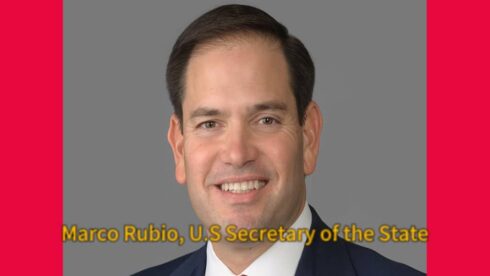U.S. Secretary of State Marco Rubio arrived in Israel on his first diplomatic tour of the Middle East, marking a crucial moment for the Biden administration’s regional policy. His visit comes amid heightened geopolitical tensions, with key discussions expected on Israeli security, Palestinian statehood, and broader U.S. strategic interests in the region. Marco Rubio, a longtime advocate for strong U.S.-Israel ties, is set to meet with Prime Minister Benjamin Netanyahu and other senior officials.
The Secretary’s arrival in Tel Aviv underscores Washington’s continued commitment to Israel despite ongoing conflicts and international pressure. With growing instability in the region, Rubio’s visit is seen as an effort to reaffirm U.S. influence while addressing pressing concerns, including the future of Gaza, Iran’s regional activities, and military cooperation between the two allies.
Marco Rubio’s Strategic Agenda: Strengthening U.S.-Israel Ties
Marco Rubio has long positioned himself as a staunch pro-Israel policymaker, advocating for increased military assistance and deeper bilateral cooperation. During this visit, he is expected to reinforce Washington’s military and economic support for Israel, particularly in the wake of escalating tensions with Hamas and Hezbollah. With U.S. arms shipments and military aid under scrutiny, Marco Rubio’s diplomatic efforts will likely focus on securing long-term security agreements beneficial to both nations.
Beyond military concerns, Marco aims to bolster economic ties, with discussions on technology collaboration, cybersecurity partnerships, and trade agreements. The U.S. is keen on expanding joint ventures in artificial intelligence, defense technology, and infrastructure development, areas where Israel has emerged as a global leader. His visit will also lay the groundwork for future U.S.-Israel diplomatic summits, reinforcing a shared vision for regional security and prosperity.
The Gaza Crisis: Marco Rubio’s Approach to Conflict Resolution
The Gaza crisis looms large over Marco Rubio’s trip, with international outcry over Israel’s military operations and Palestinian displacement. The U.S. administration has faced mounting pressure to intervene, and Marco Rubio’s visit is seen as an opportunity to navigate delicate ceasefire negotiations. His stance on Gaza reconstruction and U.S. humanitarian aid will be closely scrutinized, particularly given reports of widespread destruction and civilian casualties in the region.
MarcoRubio is expected to advocate for a long-term stabilization plan, with U.S. involvement in rebuilding Gaza while ensuring Israel’s security interests are upheld. However, his alignment with Netanyahu’s policies on Palestinian governance could prove controversial, as calls for a two-state solution clash with Israel’s expanding military operations. The outcome of these discussions could shape the next phase of U.S. Middle East diplomacy.
Marco Rubio, Iran, and Regional Security Challenges
A major focal point of Marco Rubio’s Middle East tour is Iran’s growing influence in the region. With Israel increasingly concerned about Iran’s nuclear ambitions and military presence in Syria and Lebanon, Marco Rubio is expected to reaffirm Washington’s commitment to countering Tehran’s aggression. His hardline stance against Iran has been a defining aspect of his foreign policy, and this visit will reinforce U.S.-Israel cooperation in intelligence sharing, cyber warfare, and regional defense strategies.
The U.S. has already imposed new sanctions on Iran’s Revolutionary Guard Corps (IRGC), and Rubio may push for further economic and military pressure on Tehran. Additionally, discussions with Israeli officials will likely explore joint military exercises and expanded defense pacts, signaling a more assertive U.S. posture in the region.
Rubio’s Diplomatic Balancing Act in the Middle East
While Israel is the focal point of his visit, Marco Rubio’s Middle East tour extends beyond Tel Aviv. He is set to travel to Saudi Arabia and the United Arab Emirates, where discussions will revolve around regional security, energy cooperation, and ongoing U.S. efforts to mediate the war in Ukraine. His meetings with Gulf leaders will seek to align strategic priorities on Iran, counterterrorism, and economic collaboration.
A significant aspect of his visit is his role in U.S.-Russia-Ukraine peace negotiations, as Saudi Arabia hosts initial talks aimed at ending the prolonged conflict. While Ukraine’s direct involvement remains uncertain, Marco Rubio’s diplomatic efforts could set the stage for a potential high-level peace summit involving President Biden, Vladimir Putin, and Ukrainian President Volodymyr Zelenskiy.
What Marco Rubio’s Visit Means for U.S. Foreign Policy
As Marco Rubio navigates his first major international tour, his approach will be a key indicator of how the Biden administration plans to engage with the Middle East. His visit underscores the U.S.’s strategic pivot toward reinforcing alliances, tackling security threats, and shaping the region’s post-conflict landscape.
With Israel, Gaza, Iran, and Russia-Ukraine diplomacy all on the agenda, Marco Rubio’s performance on the global stage will determine his effectiveness as Secretary of State. His ability to balance U.S. strategic interests with regional stability will be crucial in shaping Washington’s foreign policy direction for years to come.














